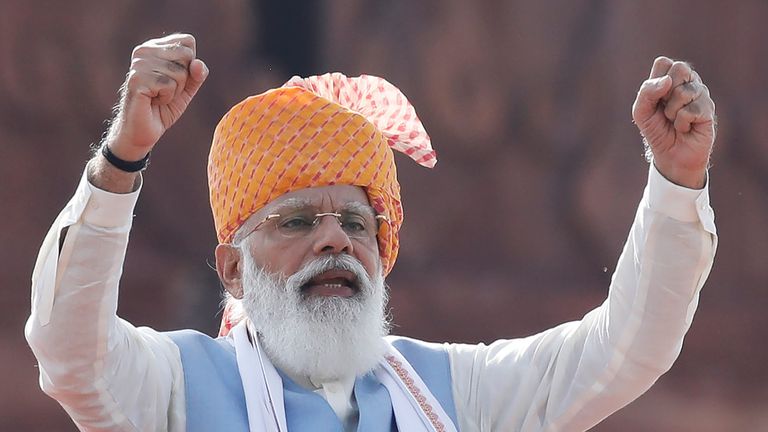India is set to spend 100trn rupees (£972bn) on a national infrastructure plan to boost economic growth and help the country meet its climate goals.
Speaking as part of Independence Day celebrations in Delhi, Prime Minister Narendra Modi said the programme will “create job opportunities for hundreds of thousands of young people”.
“It will help local manufacturers turn globally competitive and also develop possibilities of new future economic zones in the country,” he said.
Image: Mr Modi was seen inspecting a joint military guard of honour during Independence Day celebrationsWhile he did not go into great detail, he said the scheme, called “Gati Shakti”, will expand the use of cleaner fuels.
“India is moving fast towards achieving its climate goals,” he said.
AdvertisementMr Modi pledged to invest more in electric mobility, solar energy and “green hydrogen” – which does not emit carbon dioxide – in order for the country to become energy independent by 2047.
“Before the 100th anniversary of independence, we will make India energy independent,” he said.
More on India Two people dead and at least 25 trapped by landslide in northern India Nirav Modi: Diamond tycoon wins permission to appeal against extradition to India on mental health grounds Anupam Shyam: Bollywood actor who appeared in Slumdog Millionaire dies aged 63 Food bloggers call for word ‘curry’ to be cancelled over claims it is rooted in British colonialism India: Nine-year-old girl allegedly raped and murdered in Delhi Shilpa Shetty’s millionaire husband Raj Kundra in court over porn caseHe aims to wind down energy imports, which costs the country more than 12trn rupees (£117bn) each year.
India imports about 85% of its oil needs.
Image: The prime minister pledged to make India energy independent by 2047The country’s economy – the third-largest in Asia – has been battered by the coronavirus pandemic, having contracted 7.3% in the financial year that ended in March.
A second wave of COVID-19 has posed problems for its economic recovery, with experts fearing that the country will not rebound as quickly as the US and other nations.
The announcement follows similar plans in the US, where President Joe Biden’s $1trn (£721bn) infrastructure bill was passed last week.
April: COVID in India: ‘Mass vaccination can help us’In a 90-minute address from the historic Red Fort, Mr Modi outlined his government’s achievements to mark the 74th anniversary of India’s independence from British rule, hailing the country’s coronavirus vaccination efforts.
“We are proud that we didn’t have to depend on any other country for COVID-19 vaccines,” he said.
“Imagine what would have happened if India didn’t have its own vaccine.”
More than 500 million doses of the vaccines have been administered in India and about 11% of eligible adults have been fully vaccinated so far.
